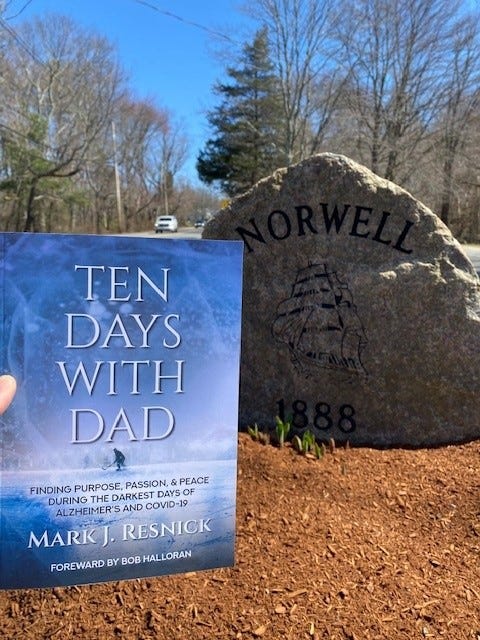Back to the Basics: How to Have a Good Day—Every Day
Redefining a “Good Day”
I’ve written before about how lucky I was to grow up in Norwell, MA, a small, wealthy suburb south of Boston. While we lived on the “not-so-wealthy” side of town, it was still a place of privilege, with top-notch schools, safe neighborhoods, and plenty of opportunities. Even today, Norwell High School ranks as the best high school on the South Shore, according to a 2024 U.S. News & World Report. That’s a high honor for a town with just over 11,000 residents.
Though I left Norwell 30 years ago, I still consider it my hometown. I don’t credit the town itself for shaping how I see the world, but I do credit my experiences on Beers Avenue, the lessons at Cole Elementary, the friendships formed in Junior High, and the spirit of competition (and success) I felt on the soccer fields. These moments were all the more meaningful as I navigated life being raised by a single parent—my dad.
Back then, a good day was simpler: riding bikes to the Little League fields, playing street or pond hockey games, chatting with friends on the phone, or staying up late to watch the Bruins. I had a lot of good days as a kid in Norwell. Honestly, there wasn’t much difference between a “good” day and a “great” one. If I had to choose a standout memory, it would be the time my fifth-grade English teacher, Mrs. Blake, praised my writing. She was the first to tell me I should explore writing outside the classroom walls, sparking a lifelong passion for words and stories.
But as we grow older, our definition of a good day shifts. It’s easy to get caught up in measuring our days by how much we accomplish or how smoothly things go at work. Yet, a truly good day often has little to do with external success. For me, a good day doesn’t depend on landing a big deal or avoiding rush hour traffic. Those things are nice, but they’re fleeting and don’t define real satisfaction.
Happiness Beyond Success
Many people equate a great day with professional success or crossing off items on their to-do lists, but true happiness goes much deeper. In fact, research shows that personal happiness has a direct impact on our success in other areas of life. When we’re happier, our cognitive abilities are enhanced, helping us make better decisions, solve problems creatively, and increase productivity. Studies even show that happier employees tend to be up to 12% more productive at work, and their positive mindset often leads to better customer interactions and improved team dynamics. Happiness is also linked to reduced stress levels, a stronger immune system, and even improved heart health, all of which contribute to greater overall well-being and resilience in the face of life’s challenges (PositivePsychology.com).
This shift in focus—from measuring a day’s success by external outcomes to valuing internal satisfaction—has made me rethink what defines a “great” day. Instead of the wins or accolades, I now see a great day as one in which I can fully show up for myself and others, regardless of the day’s challenges. A good day isn’t just about what I achieve but about the quality of my interactions, my attitude, and how I respond to setbacks.
The Power of a Daily Routine
Some of you might have expected me to say that my definition of a great day is about giving—whether it’s offering my time, lending a listening ear, or encouraging others. And while that’s true, neither external success nor giving alone defines a truly great day. What truly makes a day “great” is when I’ve honored my daily routine—my personal “vitamins” that keep me grounded. Here’s my daily checklist:
Journal
Read
Exercise
Meditate
Write
Talk or text with my kids
Get enough sleep
I know if I take these “vitamins” every day, I’ll feel fulfilled and happier overall. It’s not about a single big win or moment of success but rather the consistency of small actions that align with my values and long-term well-being.

What Defines a Good Day?
As we get older, life becomes more complicated, and we tend to complicate happiness right along with it. We start thinking that a great day has to involve huge wins—like landing a promotion or hitting a milestone. But if we get back to the basics and focus on the little things that truly matter, we can have great days almost every day.
What needs to happen in your life for it to feel like a great day? Maybe it means exercising or doing yoga, a phone call to your mom, taking a warm bath before bedtime, or journaling for five minutes a day.
Take the time to make a list of all the things that make you happy, then narrow that list down to just a few essentials. Don’t aim for 10 or more things to “do” or “experience” every single day—that’s not realistic. Start with one or two. Then, as those actions become habits, you can build up your routine over time. That’s what I did, and I’ve found myself having great days almost daily.
Yes, you’ll still have stress, problems, and maybe even hard days, but believe me, it’s possible to face those feelings and still go to bed thinking it was a good day.
Getting Back to the Basics
The truth is, we often complicate happiness as we get older. When I think back to my childhood in Norwell, it didn’t take much to have a great day. A game of pond hockey, a bike ride to the Little League fields, or a late-night Bruins game on TV were enough to make me feel like the luckiest kid in town. But as adults, we start to believe that happiness requires more—more success, more money, more achievements. We lose sight of the simplicity that defined our happiest moments.
To create more great days, we need to get back to the basics. Start with one or two small actions that bring joy and fulfillment and build from there.
As Ruth Bader Ginsburg once said:
"Be remembered as someone who used whatever talent she had to do her work to the best of her ability. And help repair tears in her society, to make things a little better through the use of whatever ability she has."
In order to use your talents and help repair the tears around us, you need to take care of your own well-being. Prioritize your happiness and personal health, so that you can give more to others and leave a lasting impact.
So, what are the basics that bring you joy? Share your thoughts and let’s help each other build more great days into our lives.
See you next week.






